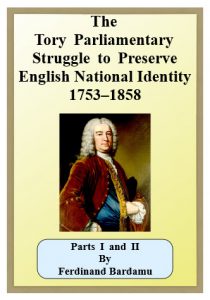Henry Pelham (1694–1754), Whig Prime Minister who introduced the Jew Bill in Parliament in 1753
Part I: The English Common Law Basis of Tory Anti-Judaism
A legal case involving Robert Calvin, although seemingly unrelated, would play a key role in shaping attitudes and beliefs about Jews and Jewishness until the mid-nineteenth century. The plaintiff was born in Edinburgh, two years after the Union of the Crowns in 1603. Some land was purchased on his behalf, to test whether his Scottish parentage was an impediment to ownership of English real property. However, it was promptly confiscated because, it was claimed, his birth had occurred outside the “ligeance” or dominion of the English Crown. This meant that Calvin, from an international perspective, was an alien. In 1608, the Lord Chancellor and justices of the Exchequer Chamber ruled in favour of the plaintiff, reasoning that since Scotland and England were ruled by the same monarchy, Calvin’s birth had actually occurred within the ligeance of King James I, making him a full subject with the same rights as an Englishman. The court concluded that he had been wrongfully dispossessed of the land.
The Elizabethan jurist Sir Edward Coke (1552–1634) used Calvin’s case to define the proper legal relationship between infidels and Christians:
All infidels are in law perpetui inimici, perpetual enemies (for the law presumes not that they will be converted, that being remota potentia, a remote possibility) for between them, as with the devils, whose subjects they be, and the Christian, there is perpetual hostility, and can be no peace.
Since Jews were infidels, they were “perpetual enemies” subject to a plethora of civil and legal disabilities. In the First Part of the Institutes of the Lawes of England (1628), Coke wrote: “If the witness be an infidel, or infamous, or of non-sane memory, or not of discretion, or a party interested, or the like, he can be no good witness.” This meant that Jews, because they were infidels, were not allowed to bear witness or testify in a court of law, even in cases of assault, robbery and murder. As far as English jurisprudence was concerned, the Jew was a legal non-entity.
Because Jews were perpetual enemies, certain interactions between Christians and Jews were punishable by death. In the Institutes, Coke “found that by the ancient laws of England, that if any Christian man did marry with a woman that was a Jew, or a Christian woman that married with a Jew, it was a felony, and the party so offending should be burnt alive.”
